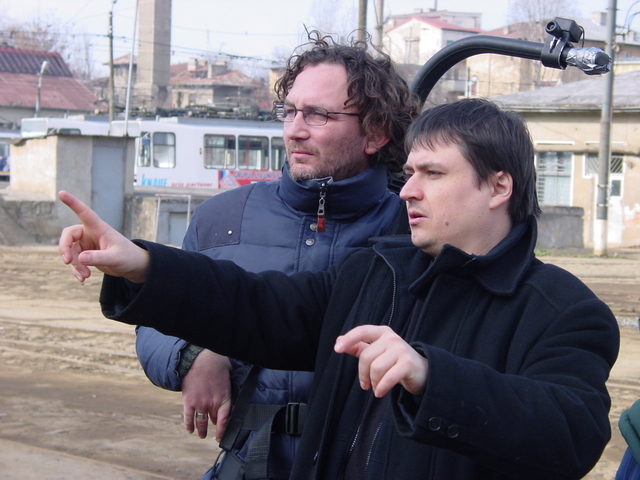FEBRUARY 4, 2008
1 Day, 20 Years Ago
By Mark Jenkins

As Many Questions as Answers: Mungiu at work, right (IFC)
When his second film, "4 Months, 3 Weeks, and 2 Days," won the Palme d'Or last year at the Cannes Film Festival, Cristian Mungiu became one of a small but rapidly expanding club of internationally acclaimed Romanian directors. The 39-year-old filmmaker, who visited Washington in November for the European Union Showcase premiere of his film, concedes that it shares qualities with the two other recent Romanian movies to win U.S. releases, "The Death of Mr. Lazarescu" and "12:08 East of Bucharest." But he argues that the similarities between these films have been overstated. I see this as a generation, but not as a school, not as a movement. We don't share an aesthetic. The films that got out in the last year are quite diverse. But I think there's a connection in the way we work. We are writer-directors, and we are also all our own producers. This gives us the freedom, within a small budget, to make whatever decisions we consider right for the film. We all use state money. We come from a country with some 35 theaters left. Nobody expects to get the money back, so there's this freedom of expression. Your film is an intimate, naturalistic account of two women: Gabita, who's seeking an illegal abortion, and her roommate, Otilia, who's helping her. Is it based on a personal tale? Some 15 years ago, someone who was then very close to me told me this story. It had already happened a few years before, which made it more frustrating, because there was nothing to do about it. I ran into this person again last year when I was looking for a story from that period. Somehow this story came up in conversation again, and I was struck by its emotional potential. It matched very much the kind of film I wanted to make. With the permission of this person, I wrote the script. What happened is very close to what you see on screen. The movie very effectively conveys the arbitrariness of power in a dictatorship. I hope you get the feeling of the period. Everybody having this little authority on you. You had this feeling that maybe you were wrong. You wouldn't really know why, but because it was possible to be controlled at any time, for it doesn't really matter what -- Even today, I carry an ID with me. Nobody would ask for one, but it's the way we were raised. You say you don't want to make films that are directly about Ceausescu's dictatorship, but it's essential that this movie be set before his 1989 overthrow. The story happened when I was 20, so that places it in Communist times. But the Communist period is just the background, and you need it to understand what happens. That's very different from the films that were shot in Romania in the '90s, which tried to settle something with the system. I think our generation is telling these stories because we are turning 40 now, and you gain this distance that you need to tell stories from your earlier life. The film concentrates not on Gabita, whose abortion is the story's catalyst, but on Otilia. For me, the main character is he who understands something about what happens, and he who makes the decisions. Initially, I started the screenplay thinking I was going to write about a couple of girls. Halfway through the first draft. I discovered that actually it's about this girl. She is the one who's going to be different the next day because she understands something from what happens to them. I allowed only one scene that wouldn't involve her directly. It was with Gabita's father coming to see her at the dormitory. It was important for me; it said something about the kind of education that we got, and the lack of communication between us and our parents. I shot the scene, but finally decided not to use it. The film's style is powerfully austere and tightly focused. We wanted a style in which we as filmmakers wouldn't be noticed. We knew from the beginning that we wanted to use long takes. We relate the story, and we don't push anybody to what's more important. I didn't want to have my perspective, 20 years later, about what happened. But to have the perspective of somebody living then. We thought it would be very strong to have the rhythm of a thriller in the second part of the film, rendering the inner thoughts of the main character and following her state of mind. Not using lots of editing, but just generating the tension with what happens in the shot. The camera does pan, and does tilt, but very, very seldom. We never pan just to see somebody else. We always had to have movement in the frame that would generate this. So it would come naturally from the story, and not be noticeable as a decision. We wanted to signal, as much as possible, that there's a bigger story than what you can see on screen. This discretion continues to the end of the film, which doesn't offer the tidy summation typical of mainstream movies. I allowed a lot of questions in the second part of the film to go unanswered. Because things happen this way in life. You'll have a lot of unanswered questions tonight when you go to sleep. Explaining everything in films comes from an approach to cinema that is not ours. Not mine, at least.